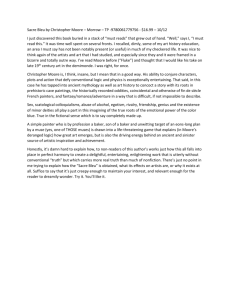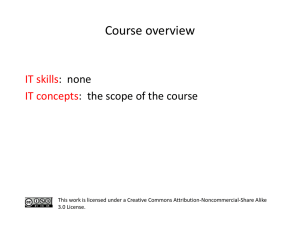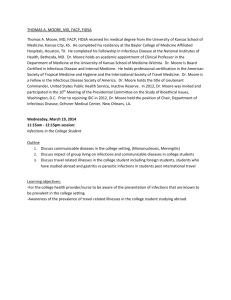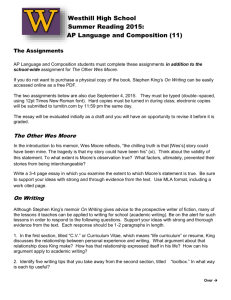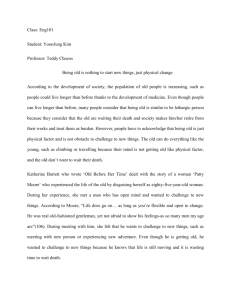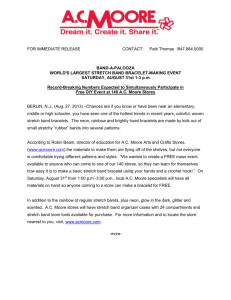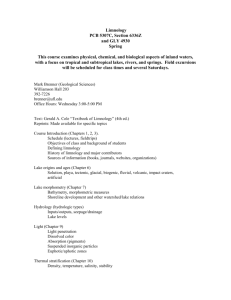NSF/98/CV - Wellesley College
advertisement
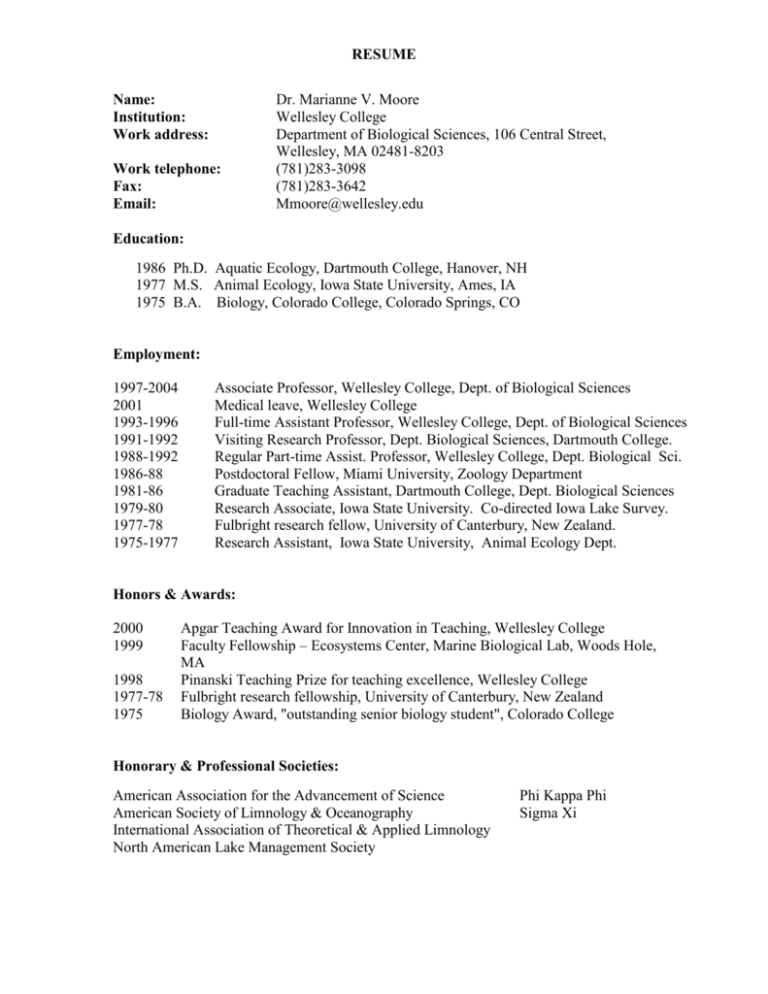
RESUME Name: Institution: Work address: Work telephone: Fax: Email: Dr. Marianne V. Moore Wellesley College Department of Biological Sciences, 106 Central Street, Wellesley, MA 02481-8203 (781)283-3098 (781)283-3642 Mmoore@wellesley.edu Education: 1986 Ph.D. Aquatic Ecology, Dartmouth College, Hanover, NH 1977 M.S. Animal Ecology, Iowa State University, Ames, IA 1975 B.A. Biology, Colorado College, Colorado Springs, CO Employment: 1997-2004 2001 1993-1996 1991-1992 1988-1992 1986-88 1981-86 1979-80 1977-78 1975-1977 Associate Professor, Wellesley College, Dept. of Biological Sciences Medical leave, Wellesley College Full-time Assistant Professor, Wellesley College, Dept. of Biological Sciences Visiting Research Professor, Dept. Biological Sciences, Dartmouth College. Regular Part-time Assist. Professor, Wellesley College, Dept. Biological Sci. Postdoctoral Fellow, Miami University, Zoology Department Graduate Teaching Assistant, Dartmouth College, Dept. Biological Sciences Research Associate, Iowa State University. Co-directed Iowa Lake Survey. Fulbright research fellow, University of Canterbury, New Zealand. Research Assistant, Iowa State University, Animal Ecology Dept. Honors & Awards: 2000 1999 1998 1977-78 1975 Apgar Teaching Award for Innovation in Teaching, Wellesley College Faculty Fellowship – Ecosystems Center, Marine Biological Lab, Woods Hole, MA Pinanski Teaching Prize for teaching excellence, Wellesley College Fulbright research fellowship, University of Canterbury, New Zealand Biology Award, "outstanding senior biology student", Colorado College Honorary & Professional Societies: American Association for the Advancement of Science American Society of Limnology & Oceanography International Association of Theoretical & Applied Limnology North American Lake Management Society Phi Kappa Phi Sigma Xi M.V. Moore 2 Research Interests: Aquatic ecology; disturbance ecology; plankton communities & fish; ecological light pollution Publications *student coauthor Moore, M.V. and S.M. Pierce*. Urban light pollution alters the depth distribution of freshwater zooplankton. Freshwater Biology. In preparation. Moore, M.V., S.J. Kohler, and M. Cheers*. 2004. Artificial light at night in freshwater habitats and its potential ecological effects. In C. Rich and T. Longcore [eds.], Ecological consequences of artificial night lighting. Island Press. In press. Jung*, J., C. Hojnowski*, H. Jenkins*, A. Ortiz*, C. Brinkley*, L. Cadish*, A. Evans*, P. Kissinger*, L. Ordal*, S. Osipova*, A. Smith*, B. Vredeveld*, T. Hodge, S. Kohler, N. Rodenhouse, and M. Moore. 2004. Diel vertical migration of zooplankton in Lake Baikal and its relationship to body size. Pages 131-140. in A.I. Smirnov and L.R. Izmest'eva, editors. Ecosystems and Natural Resources of Mountain Regions. Proceedings of the first international symposium on Lake Baikal: The current state of the surface and underground hydrosphere in mountainous areas. "Nauka", Novosibirsk, Russia. Moore, M.V., S.M. Pierce*, H.M. Walsh*, S.K. Kvalvik*, and J.D. Lim*. 2000. Urban light pollution alters the diel vertical migration of Daphnia. Verh. Internat. Verein. Limnol. 27:1-4. Folt, C.L., C.Y. Chen, M.V. Moore and J. Burnaford. 1999. Synergism and antagonism among multiple stressors. Limnology and Oceanography 44:864-877. Moore, M.V., *P. Zakova, *K.A. Shaeffer, and *R.P. Burton. 1998. Potential effects of Canada geese and climate change on phosphorus inputs to suburban lakes of the Northeastern U.S.A. Lake and Reservoir Management 14:52-59. Moore, M.V., M.L. Pace, J.R. Mather, P.S. Murdoch, R.W. Howarth, C.Y. Chen, P.A. Flebbe, C.L., Folt, H.F. Hemond, and C.T. Driscoll. 1997. Potential effects of climate change on freshwater ecosystems of the New England/MidAtlantic region. Hydrological Processes 11:925-947. Moore, M.V., M.L. Pace, J.R. Mather, P.S. Murdoch, R.W. Howarth, C.Y. Chen, P.A. Flebbe, C.L., Folt, H.F. Hemond, and C.T. Driscoll. 1997. Potential effects of climate change on freshwater ecosystems of the New England/MidAtlantic region. Pages 107-130. IN: C.E. Cushing, editor. Freshwater ecosystems and climate change in North America: a regional assessment. Wiley, Chichester, NY. (Same as publication above) Arnell, N. et al. 1996. Hydrology and freshwater ecology, Chapter 10. IN: Watson, R.T., M.C. Zinyowera, and R.H. Moss, editors. Climate Change 1995: Impacts, Adaptations, and Mitigation of Climate Change--Scientific-Technical Analyses. Second Assessment Report of the Intergovernmental Panel on Climate Change. Cambridge University Press, Cambridge. 878 pp. (M.V. Moore is one of 27 authors contributing to this chapter. The book containing this chapter is one of 3 volumes comprising the second international assessment of climate change.) M.V. Moore 3 Moore, M.V., C.L. Folt, and R.S. Stemberger. 1996. Consequences of elevated temperatures for zooplankton assemblages in temperate lakes. Archiv fur Hydrobiol. 135:289-319. Moore, M.V., C.Y. Chen, C.T. Driscoll, P.A. Flebbe, C.L., Folt, H.F. Hemond, R.W. Howarth, J.R. Mather, P.S. Murdoch, and M.L. Pace. 1995. Region 4. - MidAtlantic and New England. IN: McKnight, D.M., editor. Regional Assessment of Freshwater Ecosystems and Climate Change in North America. Symposium Report. Published by American Society of Limnology and Oceanography and North American Benthological Society. 18 pp. *Colby, J.A., M.V. Moore, and G. Estabrooks. 1995. Supermarket marine biology. American Biology Teacher. 57:37-39. Moore, M.V., N.D. Yan, and T. Pawson. 1994. Omnivory of the larval phantom midge (Chaoborus ) and its potential significance for freshwater planktonic food webs. Canadian Journal of Zoology. 72:2055-2065. Moore, M.V. and C.L. Folt. 1993. Zooplankton body size and community structure: effects of thermal and toxicant stress. Trends in Ecology and Evolution 8:178-183. *Fischer, J.M. and M.V. Moore. 1993. Juvenile survivorship of a planktonic insect: effects of food limitation and predation. Freshwater Biology 30:35-45. Smith, S.L., R.R. Pieper, M.V. Moore, L.G. Rudstam, C.H. Greene, C.N. Flagg, C.E.Williamson, and J.E. Zamon. 1992. Acoustic techniques for the in situ observation of zooplankton. Arch. Hydrobiol. Beih. 36: 23-43. Moore, M.V. and R.E. Lee, Jr. 1991. Surviving the big chill: overwintering strategies of aquatic and terrestrial insects. American Entomologist. 37:111-118. Oris, J.T., R.W. Winner, and M.V. Moore. 1991. A four-day survival and reproduction toxicity test for Ceriodaphnia dubia. Environ. Toxicol. Chem. 10:217-224. Winner, R.W., H.A. Owen, M.V. Moore. 1990. Seasonal variability in the sensitivity of freshwater lentic communities to a chronic copper stress. Aquat. Toxicol. 17:75-92. Moore, M.V. and R.W. Winner. 1989. Relative sensitivity of Ceriodaphnia dubia laboratory tests and pond communities of zooplankton and benthos to chronic copper stress. Aquat. Toxicol. 15:311-330. Moore, M.V. 1988. Density-dependent predation of early instar Chaoborus feeding on multi-species prey assemblages. Limnol. Oceanogr. 33:258-270. Moore, M.V. 1988. Differential use of food resources by the instars of Chaoborus punctipennis. Freshwat. Biology 19:249-268. Confer, J.L. and M.V. Moore. 1987. Interpreting selectivity indices calculated from field data or conditions of prey replacement. Can. J. Fish. Aquat. Sci. 44:1529-1533. Moore, M.V. and J.J. Gilbert. 1987. Age-specific Chaoborus predation on rotifer prey. Freshwat. Biology. 17:223-236. Moore, M.V. 1986. Method for culturing the phantom midge, Chaoborus (Diptera: Chaoboridae) in the laboratory. Aquaculture 56:307-316. Govro, K., M.V. Moore, and C.L. Olson. 1982. Effects of an ammonia-rich municipal sewage effluent on Iowa River fauna near Marshalltown, Iowa. Iowa Acad. of Sci. 89(4):160-167. Bachmann, R.W., M.R. Johnson, M.V. Moore, and T.A. Noonan. 1980. Clean lakes classification study of Iowa's lakes for restoration. Published and funded by Iowa Dept. of Envir. Quality and U.S. Environmental Protection Agency. 715 p. M.V. Moore 4 Media Coverage of Research: Articles (2001-2004): American Scientist, Boston Globe, California Wild, Christian Science Monitor, Conservation in Practice, Discover, Frontiers in Ecology & the Environment, Field & Stream, New York Times, Science News. TV appearances: --Interviewed and filmed using light instruments on a local Boston lake. Boston's Fox TV station. October, 2002. Invited Talks (1998 – 2004 only): "Artificial Night Lighting and its Potential Effects Nearshore and Offshore in Lakes", Annual meeting, North American Lake Management Society, Special Symposium - "Littoral Zone Management & Biocomplexity", Foxwoods, CT. November 7, 2003. "Lake Baikal: The Soul of Siberia", Limnology class, Dept of Zoology, University of New Hampshire, Nov 19, 2003. "An Inspiration for Global Education: Limnology at Lake Baikal", Annual meeting, American Society of Limnology & Oceanography, Special Symposium, Salt Lake City, UT. February 10, 2003. "Measuring Light Pollution in Urban Lakes and its Effects on Lake Invertebrates", Conference on Ecological Consequences of Artificial Night Lighting. Sponsored by UCLA Institute of the Environment and The Urban Wildlands Group, UCLA, Los Angeles. February 22-24, 2002. “Something’s Fishy at Logan Airport”, Boston Museum of Science, Boston. (Funded by Lowell Lecture Series and delivered to students from 4 high schools in South Boston), April 11, 2000. "Eccentricities of Urban Lakes", Institute of Ecosystem Studies, Millbrook, New York. March 17, 2000. “City Lights: Are They Changing the Rhythms of the Night?”, Ecosystems Center, Marine Biological Laboratory, Woods Hole, MA. Sept 6, 1999. "A Novel Venue for Marine Science Education: Logan Airport, Boston." Annual meeting, American Society of Limnology and Oceanography, Special Education Symposium, Santa Fe, NM. February, 1999. Research Grant Proposals (1990 – 2004 only): 2003 Wellesley College, Brachman-Hoffman Small Grant—Quantifying Artificial Night Lighting Above & Below Water. $4000. 2000 Wellesley College, Faculty Award—Urban Light Pollution: Measuring its Spectral Quality. $2500. 2000 Wellesley College, Brachman-Hoffman Small Grant—Urban Lakes: Quantifying Land use within their Watersheds and Artificial Illumination at Night. $4000. 1998 WHOI and MIT Sea Grant Programs--Multimedia causeway to art and marine science at Logan Airport. $9,400. M.V. Moore 1996-99 1994-96 1992-96 1991-92 1989-91 5 Wellesley College, Brachman-Hoffman Research Fellowship-- Effects of urbanization on the physical environment of lakes. $24,980. U.S. Geological Survey & U.S. Environmental Protection Agency --Potential effects of climate change on freshwater ecosystems in the New England/MidAtlantic region. (Subcontracted from Dr. Diane M. McKnight, USGS). $2000. U.S. Environmental Protection Agency--Potential effects of elevated temperature on freshwater zooplankton in polluted and unpolluted waters. $318,665. National Science Foundation--How do elevated temperatures influence food web interactions? $18,000. Ontario Ministry of the Environment, Canada--Diet of Chaoborus in Plastic Lake,Ontario (This work quantified the impact of an invertebrate predator in an acidstressed lake.) $12,800. Reviewing: 1993-2004 Editorial board member, Environmental Pollution 2003 Panelist, Committee of Visitors, NSF, Washington, D.C. -- Evaluated performance of Division of Environmental Biology (DEB) from 19992002. 2000-2001 Editorial board member, Freshwater Systems (online journal) 1998 Panelist, NSF Ecology review panel, Washington, D.C. (April 1-3, 1998) Ad hoc journal reviewing – Ambio, American Midland Naturalist, Aquatic Toxicology, Archiv fur Limnologie, Canadian Journal of Zoology, Canadian Journal of Fisheries and Aquatic Sciences, Deep-Sea Research II, Ecology, Ecological Applications, Ecological Monographs, Evolution, Ergebnisse der Limnologie, Hydrobiologia, J. Lake & Reservoir Management, J. Plankton Research, Limnology & Oceanography, New Zealand Journal of Marine & Freshwater Sciences, Oecologia, Ohio J. of Science Ad hoc proposal reviewing - Sea Grant Progam, (University of Maine), UNH Agricultural Experiment Station, National Science Foundation, Center for Disease Control (Workshop plans for Pfiesteria issues) Teaching Grant Proposals (1990 – 2004 only): 2001 Curriculum Development for EXTD 212 Lake Baikal: The Soul of Russia—Wellesley College, Hughes Curriculum Development Program, $8894. Funded purchase of field equipment. Coauthored with Dr. Sue Kohler. 2001 Lake Baikal: The Jewel of Russia"-- Wellesley College, Education, Research, and Development (ER&D) Committee, $7,500. Sponsored initial offering of this experimental course. Coauthored with Dr. Tom Hodge. 2000 Planning Grant for Lake Baikal course --ER&D, Wellesley College, $1000. Sponsored reconnaisance trip to biological station at Lake Baikal, Russia to M.V. Moore 6 evaluate facilities for teaching field course. Coauthored with Dr. Tom Hodge. 1996 1992-95 1991-92 Development of Discovery-oriented Labs using the World Wide Web--ER&D, Wellesley College, $500. Real-time data in the fields of aquatic science and environmental science were located on the WWW and used to develop problem sets and discovery-oriented labs. Mentoring Program for Women & Minorities in Science-- New England Consortium of Undergraduate Science Education, $3000 per year. Co-authored with Dr. Carol L. Folt. Funds attendance and participation of research students at national meetings of scientific societies. Cooperative educational and research training program on the ecology of threatened tropical ecosystems-- New England Consortium of Undergraduate Science Education, $21,000. Funded an intensive field biology course for undergraduates from Williams College and Wellesley College. Taught in Costa Rica & Belize, January 1992. Coauthored with Dr. Nick Rodenhouse. Courses Taught (1998 - 2004): Bisc 111 Introductory Organismal Biology (Spring 1997, 1999) Bisc 210 Marine Biology with Laboratory (Fall 1998, 2000, 2001, 2003, 2004) Bisc 308 Tropical Ecology (Fall/Wintersession 1997-98, 2000-01) Bisc 307 Ecology of Freshwaters (Spring 1998, 2004) EXP 212 Lake Baikal: The Soul of Siberia (Spring/Summer 2001) ES/RAST 212 Lake Baikal: The Soul of Siberia (Spring/Summer 2003) Undergraduate research mentoring: Total undergraduate research students (1990-2004): 42 Hobbies: Bicycling, lifting weights, gardening, and cooking

